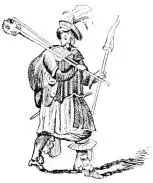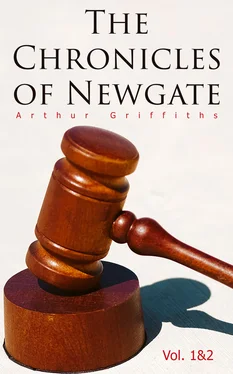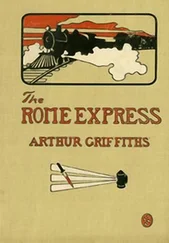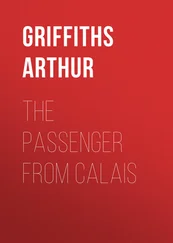Nothing could exceed the cool impudence with which reputed robbers showed themselves in public places. They did not always escape capture, however. “A noted highwayman in a scarlet cloak,” says Luttrell, “and coat laced with gold taken in Covent Garden.” Another was taken in the Strand and sent to Newgate. Five more were captured at the Rummer, Charing Cross; three others, notorious highwaymen, taken at the ‘Cheshire Cheeze.’ At times they fought hard for liberty. “One Wake, a highwayman, pursued to Red Lion Fields, set his back against the wall and faced the constables and mob. He shot the former, and wounded others, but was at last taken and sent to Newgate.” Whitney, the famous highwayman, was taken without Bishopsgate, being “discovered by one Hill, as he (Whitney) walked the street. Hill observed where the robber ‘housed’ and calling for assistance, went to the door.” Whitney defended himself for about an hour, but the people increasing, and the officers of Newgate being sent for, he surrendered himself, but not before he had stabbed Hill with a bayonet, “not mortal.” He was cuffed and shackled with irons, and committed to Newgate.
Whitney had done business on a large scale. He had been arrested before by a party of horse despatched by William III., which had come up with him lurking between St. Alban’s and Barnet. He was attacked, but made a stout defence, killing some and wounding others before he was secured. He must have got free again very soon afterwards. His second arrest, which has just been detailed, was followed by that of many others of his gang. “Three were seized near Chelsea College by some soldiers; two more were in company, but escaped.” On Sunday two others were taken; one kept a livery stable at Moorfield’s. Soon after his committal there was a strong rumour that he had escaped from Newgate, but “he continues closely confined there, and has forty pounds weight of irons on his legs. He had his tailor to make him a rich embroidered suit with peruke and hat, worth £100; but the keeper refused to let him wear them, because they would disguise him from being known.”[70] Whitney made many attempts to purchase pardon. He offered to discover his associates, and those that give notice when and where the money is conveyed on the roads in coaches and waggons. He was, however, put upon his trial, and eventually convicted and sentenced to death. He went in the cart to the place of execution, but was reprieved and brought back to Newgate with a rope round his neck, followed by a “vast” crowd. Next night he was carried to Whitehall and examined as to the persons who hired the highwaymen to rob the mails. But he was again ordered for execution, and once more sought to gain a reprieve by writing a letter in which he offered, if he might have his pardon, to betray a conspiracy to kill the king. His last appeal was refused, and he suffered at Porter’s Block, near Cow Cross, Smithfield.
Determined efforts were made from time to time to put down these robberies, which were often so disgracefully prevalent that people hardly dared to travel along the roads. Parties of horse were quartered in most of the towns along the great highways. Handsome rewards were offered for the apprehension of offenders. A proclamation promised £10 for every highwayman taken, and this was ere long increased to £40, to be given to any who might supply information leading to an arrest. Horses standing at livery in and about London, whose ownership was at all doubtful, were seized on suspicion, and often never claimed. It was customary to parade before Newgate persons in custody who were thought to be highwaymen. They were shown in their riding-dresses with their horses, and all gentlemen who had been robbed were invited to inspect this singular exhibition.[71] But the practice flourished in spite of all attempts at repression.
One or two types of the highwaymen of the seventeenth century may here be fitly introduced. One of the earliest and most celebrated was Jack Cottington, alias Mulled Sack, who had been a depredator throughout the Commonwealth epoch, and who enjoyed the credit of having robbed Oliver Cromwell himself on Hounslow Heath. His confederate in this, Horne,

“Mulled Sack.”
once a captain in Downe’s foot regiment, was overtaken, captured, and hanged, but Cottington escaped. Jack Cottington began as a chimney-sweep, first as an apprentice, then on his own account, when he gained his soubriquet from his powers in drinking mulled sack. From this he graduated, and soon gained a high reputation as a pickpocket, his chief hunting-ground being churches and puritan meeting-houses, which he frequented demurely dressed in black with a black roquelaire . He succeeded in robbing Lady Fairfax of a gold watch set with diamonds and a gold chain as she was on her way to Dr. Jacomb’s lecture at Ludgate; and a second time by removing the lynch-pin from her Ladyship’s carriage when on her way to the same church, he upset the coach, and giving her his arm, relieved her of another gold watch and seals. After this he became the captain of a gang of thieves and night prowlers, whom he organized and led to so much purpose that they alarmed the whole town. His impudence was so great that he was always ready to show off his skill as a thief in any public-house if he was paid for it, in a performance he styled “moving the bung.” He was not content to operate in the city, but visited the Parliament House and Courts of Law at Westminster, and was actually caught in the act of picking the Protector’s pocket. He narrowly escaped hanging for this, and on coming out of gaol took permanently to the highway, where he soon achieved a still greater notoriety. With half-a-dozen comrades he robbed a government waggon conveying money to the army, and dispersed the twenty troopers who escorted it, by attacking them as they were watering their horses. The waggon contained £4000, intended to pay the troops quartered at Oxford and Gloucester. Another account states that near Wheatley, Cottington put a pistol to the carrier’s head and bade him stand, at which both carter and guard rode off for their lives, fearing an ambuscade. The town of Reading he laid under frequent contribution, breaking into a jeweller’s shop in that town and carrying off the contents, which he sported on his person in London. Again at Reading, hearing that the Receiver-General was about to send £6000 to London in an ammunition waggon, he entered the receiver’s house, bound the family, and decamped with the money. Being by this time so notorious a character, he was arrested on suspicion, and committed for trial at Abingdon Assizes. There, however, being flush of cash, he found means to corrupt the jury and secure acquittal, although Judge Jermyn exerted all his skill to hang him. His fame was now at its zenith. He became the burthen of street songs—a criminal hero who laughed the gallows to scorn. But about this time he was compelled to fly the country for the murder of Sir John Bridges, with whose wife he had had an intrigue. He made his way to Cologne, to the Court of Charles II., whom he robbed of plate worth £1500. Then he returned to England, after making overtures to Cromwell, to whom he offered certain secret papers if he might be allowed to go scot free. But he was brought to the gallows, and nobly deserved his fate.
Claude Duval is another hero whose name is familiar to all readers of criminal chronology. A certain halo of romance surrounds this notorious and most successful highwayman. Gallant and chivalrous in his bearing towards the fair sex, he would spare a victim’s pockets for the pleasure of dancing a “corranto” with the gentleman’s wife. The money he levied so recklessly he lavished as freely in intrigue. His success with the sex is said to have been extraordinary, both in London and in Paris. “Maids, widows, and wives,” says a contemporary account, “the rich, the poor, the noble, the vulgar, all submitted to the powerful Duval.” When justice at length overtook him, and he was cast for death, crowds of ladies visited him in the condemned hold; many more in masks were present at his execution. After hanging he lay in state in the Tangier Tavern at St. Giles, in a room draped with black and covered with escutcheons; eight wax tapers surrounded his bier, and “as many tall gentlemen in long cloaks.” Duval was a Frenchman by birth—a native of Domfront in Normandy, once a village of evil reputation. Its curé was greatly surprised, it is said, at finding that he baptized as many as a hundred children and yet buried nobody. At first he congratulated himself in residing in an air producing such longevity; but on closer inquiry he found that all who were born at Domfront were hanged at Rouen.
Читать дальше













